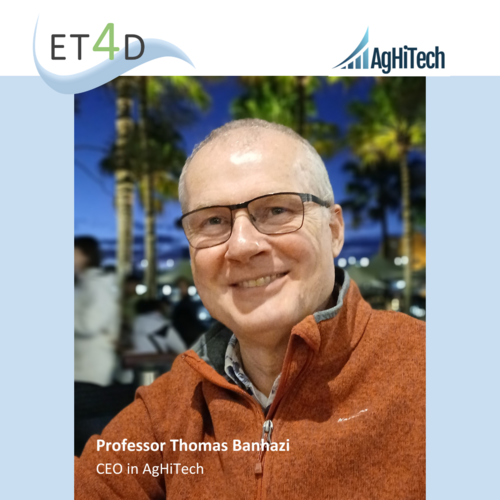Partner Interview: Professor Thomas Banhazi
How can Precision Technologies impact the future of sustainable dairy farming?

In a series, ET4D interviews experts of the project to give their insights on core developments within dairy farming. This is the fifth in the series.
The ET4D project is dedicated to developing smarter, more sustainable IoT solutions for dairy farming. As deputy coordinator, AgHiTech leads the development of Enviro-Detect™, a precision farming system that helps farmers monitor barn environments and thus indirectly animal welfare in real time.
We spoke with AgHiTech’s CEO, Professor Thomas Banhazi, about how these technologies are supporting farmers today, the challenges they face in wider adoption, and the role smart farming will play in shaping the future of the dairy industry. The interview is prepared by Innvite ApS (Denmark).
Q1: How does the Enviro-Detect specifically help the dairy farmer on a day-to-day basis?
Enviro-Detect (ED) continuously monitors critical on-farm conditions such as ventilation rates, air temperature, relative humidity, ammonia, carbon dioxide and dust concentrations both inside and outside of the buildings that allow the real time evaluation of the buildings climate modification capacity. In addition, ED calculates real time the emissions rates of ammonia and dust from the building allowing farmers to assess their environmental impacts. By providing farmers with real-time data, the system enables them to take immediate corrective actions; whether adjusting ventilation, managing bedding, or optimising building hygiene. This not only reduces animal stress and improves welfare but also enhances milk yield and farm efficiency. For the farmer, it means fewer health problems to manage, lower costs from preventable issues, and more time to focus on long-term improvements rather than reacting to problems after they occur.
Q2: What are some of the barriers for a wide adaptation of smart technologies such as Enviro-Detect in the dairy industries?
Despite their clear benefits, smart technologies face several barriers before widespread adoption. The initial investment costs can deter farmers, particularly small and medium-sized enterprises. Many farmers also lack confidence in digital technologies or the training to use them effectively. Data management and data ownership concerns create further hesitation, as farmers want assurance that their data will be secure and used responsibly. Additionally, integration with existing farm infrastructure can be complex, especially for older facilities. To overcome these challenges, solutions must demonstrate clear financial returns, provide user-friendly interfaces, and be backed by strong and practical training programs.
Q3: Looking ahead, how do you see smart precision farming technologies shaping the future of dairy farming in Europe and globally?
Smart precision farming technologies are set to transform dairy farming by shifting the sector from experience/tradition-based to evidence-based decision-making. In Europe, this aligns closely with sustainability goals under the Green Deal and CAP reforms, helping farmers reduce emissions, optimise resource use, and improve animal welfare. Globally, these technologies will level the playing field, allowing farms of different sizes and contexts to benefit from real-time insights and predictive analytics. As AI and IoT tools become more affordable and interoperable, they will empower farmers to balance productivity with sustainability, ensuring dairy farming remains resilient, profitable, and socially acceptable in a rapidly changing world.
Intro for Thomas Banhazi
Professor Thomas Banhazi is the founder and CEO of AgHiTech, (an IoT focused company based in Hungary) and InnoTech Vision ApS. (a Danish company specialised in applied R&D) to help farmers adopt innovative technologies that improve animal welfare, environmental sustainability and farm profitability. Under his leadership, both AgHiTech and InnoTech have become key partners in a number of European research projects, including ET4D, where the company leads the development of the Enviro-Detect™ smart farming system. In addition to his industry role, Prof. Banhazi is Adjunct Principal Scientist at the University of Southern Queensland (Australia) and an Affiliated Professor at the Wroclaw University of Environmental and Life Sciences (Poland), with a strong academic track record in precision livestock farming and environmental management.
